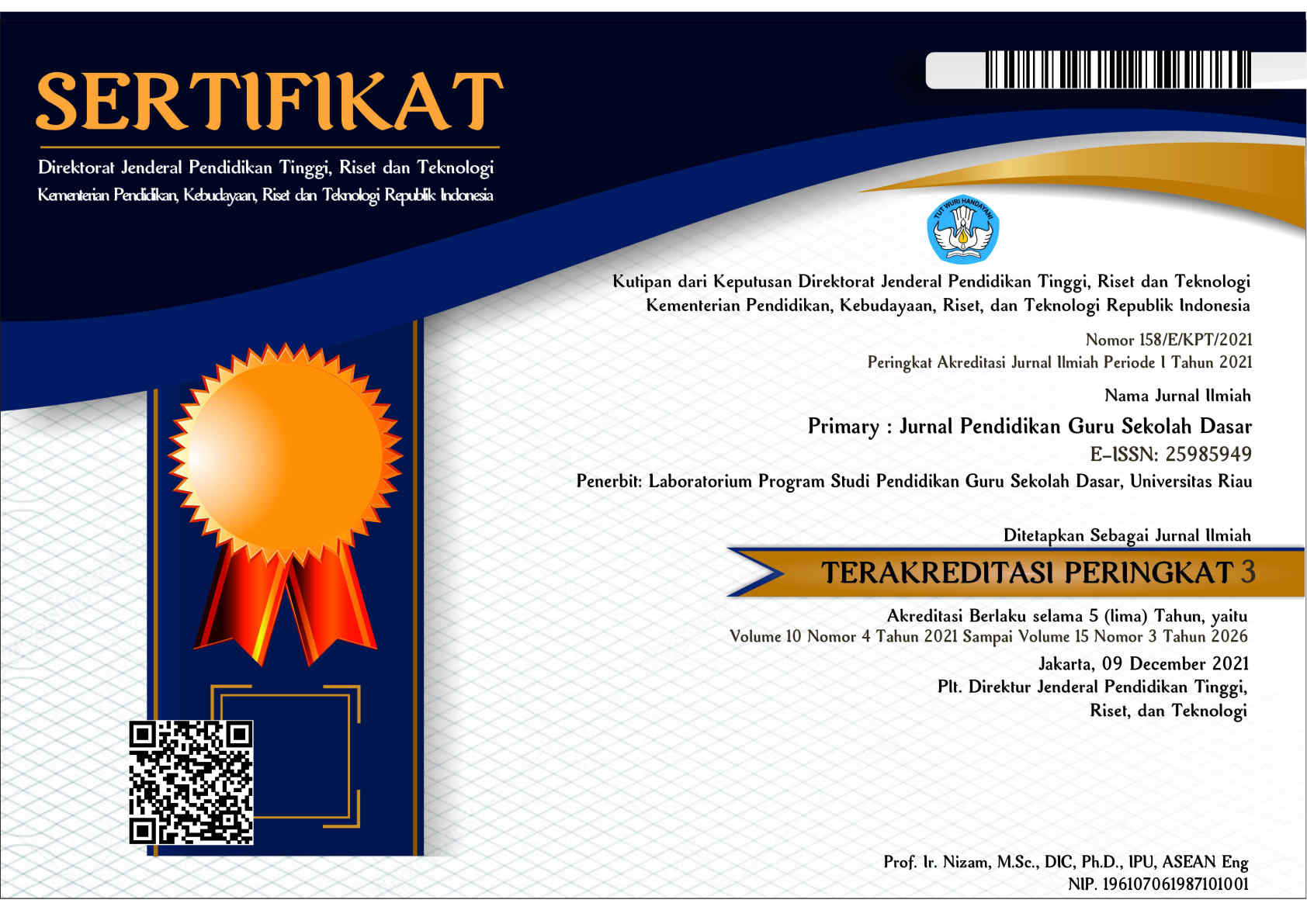THE EFFECTIVENESS OF DISCOVERY LEARNING MODEL TO IMPROVE CRITICAL THINKING ABILITY AND SELF EFFICACY OF ELEMENTARY SCHOOL STUDENTS
Abstract
Keywords
Full Text:
PDFReferences
Agcam, R., & Muzaffer, P. B. (2016). Exploring Self-Efficacy Beliefs of Primary Schools Teachers in Turkey. European Journal of Education Studies, 12(11), 120–133.
Arikunto, S. (2013). Prosedur Penelitian Suatu Pendekatan Praktik. PT Raja Grafindo Persada.
Aryani, Y. D., & Wasitohadi. (2020). Pengaruh Penerapan Model Discovery Learning terhadap Kemampuan Berpikir Kritis Muatan IPA Kelas IV. Jurnal Riset Pendidikan Dasar, 3(1), 34–40.
Aziz, A., Budiyono, & Subianti, S. (2015). Eksperimentasi Model Pembelajaran Inquiry Learning dan Discovery Learning terhadap Prestasi Belajar dan Kemampuan Komunikasi Matematis pada Materi Bangun Ruang Sisi Datar ditinjau dari Kecerdasan Spasial Siswa Kelas VIII SMP Negeri Se-Kota Surakarta. Journal of Mathematics and Mathematics Education, 5(1), 11–24.
Azizah, M., Sulianto, J., & Cintang, N. (2018). Analisis Keterampilan Berpikir Kritis Siswa Sekolah Dasar pada Pembelajaran Matematika Kurikulum 2013. Jurnal Penelitian Pendidikan, 35(1), 61–70. https://doi.org/10.15294/jpp.v35i1.13529
Changwong, K., Sukkamart, A., & Sisan, B. (2018). Critical thinking Skill Development: Analysis of A New Learning Management Model for Thai High Schools. Journal of International Studies, 11(2), 37–48.
Feriady, M., Harnanik, & Sunarto, St. (2012). Pengaruh Presepsi Siswa tentang Ketrampilan Mengajar Guru dan Fasilitas Belajar Siswa Siswa terhadap Minat Belajar IPS Kelas VIII SMP N 3 Purbalingga. Economic Educayion Analysis Journal, 1(2), 1–7.
Kristin, F., & Dwi, R. (2016). Pengaruh Penerapan Model Pembelajaran Discovery Learning terhadap Hasil Belajar IPS pada Siswa Kelas 4 SD. Jurnal Scholaria, 6(1), 84–92.
Kurniawati, D. (2016). Hubungan Antara Efikasi Diri Dengan Kemandirian Belajar Siswa Kelas V SD Negeri Se-Kecamatan Srandakan. Jurnal Pendidikan Guru Sekolah Dasar, 5(1), 2197–2208.
Pertiwi, M., Yulianti, L., & Qohar, A. (2017). Keterampilan Berpikir Kritis pada Pembelajaran IPA Siswa Kelas V Sekolah Dasar (SD). Jurnal Pendidikan, 6(14), 827–835.
Sanjaya, F. (2019). Efektifitas Pembelajaran Pendekatan Saintifik terhadap Kemampuan Berpikir Kritis Siswa (Studi Kuasi Eksperimen pada Mata Pelajaran IPS Kelas VII D di SMPN 1 Pacet-Cianjur. Jurnal Kajian Pendidikan Ekonomi Dan Ilmu Ekonomi, 3(1), 19–27.
Setyasto, N., & Bayu, W. (2017). Penerapan Perangkat Pembelajaran IPS Model Think-Pair-Share (TPS) dengan Media Video Untuk Meningkatkan Karakter, Aktivitas dan Hasil Belajar Siswa. Jurnal Pendidikan, 2(2), 128–133.
Tiana, N. L. (2015). Pengaruh Strategi Guided Discovery Learning terhadap Kemampuan Berpikir Kritis pada Pembelajaran IPS Siswa Kelas V Sekolah Dasar. Jurnal Pendidikan Dasar, 6(2), 266–274.
Utari, A., & Syamsul, H. S. (2018). Pengaruh Self Efficacy terhadap Prestasi Belajar pada Mata Pelajaran Ekonomi (Survey Kepada Siswa-Siswa Kelas XI IPS SMAN Se-Kota Bandung. Jurnal Ilmiah Pendidikan Dan Ekonomi, 2(1), 1–9.
Walfajiri. (2019). Peningkatan Kemampuan Berpikir Kritis Dan Hasil Belajar Tematik Muatan IPA Melalui Model Problem Based Learning Kelas 5 SD. Jurnal Basicedu, 3(1), 16–20.
Yusmanto, & Tatang, H. (2017). Pengaruh Penerapan Model Pembelajaran Discovery Learning terhadap Peningkatan Kemampuan Berpikir Kritis Matematis dan Self Confidence Siswa Kelas V Sekolah Dasar. Jurnal Pendidikan Dasar, 7(2), 1–12.
DOI: http://dx.doi.org/10.33578/jpfkip.v12i3.9844
Refbacks
- There are currently no refbacks.
Copyright (c) 2023 Ana Mufidatus Sa’adah, Haryono, Tri Joko Raharjo

This work is licensed under a Creative Commons Attribution-NonCommercial-ShareAlike 4.0 International License.
____________________________________________________________
Primary: Jurnal Pendidikan Guru Sekolah Dasar
Secretariat
Program Studi Pendidikan Guru Sekolah Dasar
Gedung B1, FKIP Universitas Riau
Kampus Bina Widya Km. 12,5 Simpang Baru Panam
Pekanbaru Riau Indonesia 28293
e-mail : primary@ejournal.unri.ac.id



